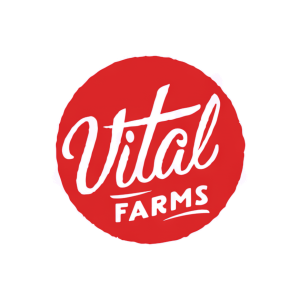Vital Farms Reports First Quarter 2023 Financial Results
First Quarter Net Revenue a Record
Volume Grew
AUSTIN, Texas, May 04, 2023 (GLOBE NEWSWIRE) -- Vital Farms (Nasdaq: VITL), a Certified B Corporation that offers a range of ethically produced foods nationwide, today reported financial results for its first quarter ended March 26, 2023.
Financial highlights for the first quarter include:
- First Quarter 2023 Net Revenue increase of
54.7% to$119.2 million - First Quarter 2023 Net Income of
$7.2 million - First Quarter 2023 Adjusted EBITDA of
$13.9 million 1
“2023 is off to a tremendous start, as we achieved the highest net revenue and Adjusted EBITDA in a single quarter in Vital Farms' history at
Diez-Canseco continued, “Vital Farms’ prolonged success is grounded in our consistent focus on working with our stakeholder community to generate sustained, positive outcomes. Once again, our farmers continued to execute well during a tough operating environment. The work ethic demonstrated by our crew members and external partners to satisfy the needs of our customers and consumers during the period was motivational. It underscores the potential of our organization as we further our mission of improving the lives of people, animals, and the planet through food.”
1 Adjusted EBITDA is a non-GAAP financial measure defined in the section titled “Non-GAAP Financial Measures” below and is reconciled to net income, its closest comparable GAAP measure, at the end of this release.
For the 13 Weeks Ended March 26, 2023
Net revenue increased
Gross profit was
Income from operations in the first quarter of 2023 was
Net income was
Net income per diluted share was
Adjusted EBITDA was
Balance Sheet and Cash Flow Highlights
Cash, cash equivalents and marketable securities were
Capital expenditures totaled
Update on Fiscal 2023 Outlook
Thilo Wrede, Vital Farms' Chief Financial Officer, commented: “We are pleased with our outstanding financial performance in the first quarter. Looking forward, we believe Vital Farms is well positioned to navigate the dynamic operating environment that is likely to persist throughout fiscal 2023.”
- For the full fiscal year 2023, management is maintaining guidance for net revenue of more than
$450 million , expecting higher net revenue growth rates and gross margin in the first half than in the second half of the year. - Management is also maintaining guidance for Adjusted EBITDA of more than
$30 million for the full fiscal year 2023, expecting Adjusted EBITDA in the first half likely to exceed Adjusted EBITDA in the second half of the year. - Finally, management continues to expect fiscal year 2023 capital expenditures in the range of
$25 t o$30 million .
Vital Farms’ guidance continues to assume that there are no additional significant disruptions to the supply chain or its customers or consumers, including any issues from adverse macroeconomic factors. Vital Farms cannot provide a reconciliation between its forecasted Adjusted EBITDA and net income (loss), its most directly comparable GAAP measure, without unreasonable effort due to the unavailability of reliable estimates for income taxes, among other items. These items are not within our control and may vary greatly between periods and could significantly impact future financial results.
Conference Call and Webcast Details
Vital Farms will host a conference call and webcast at 8:30 a.m. ET today to discuss the results. To participate on the call and receive dial in information, please register here: Q1 2023 VITL Conference Call. Alternatively, participants may access the live webcast on the Vital Farms Investor Relations website at https://investors.vitalfarms.com under “Events.” The webcast will be archived in 30 days.
About Vital Farms
Vital Farms (Nasdaq: VITL) is a Certified B Corporation that offers a range of ethically produced foods nationwide. Started on a single farm in Austin, Texas in 2007, Vital Farms has become a national consumer brand that works with over 300 family farms and is the leading U.S. brand of pasture-raised eggs by retail dollar sales. Vital Farms' ethics are exemplified by its focus on the humane treatment of farm animals and sustainable farming practices. In addition, as a Delaware public benefit corporation, Vital Farms prioritizes the long-term benefits of each of its stakeholders, including farmers and suppliers, customers and consumers, communities and the environment, crew members, and stockholders. Vital Farms' products, including shell eggs, butter, hard-boiled eggs, and liquid whole eggs, are sold in over 22,000 stores nationwide. For more information, please visit www.vitalfarms.com.
Forward-Looking Statements
This press release and the earnings call referencing this press release contain “forward-looking” statements, as that term is defined under the federal securities laws, including but not limited to statements regarding Vital Farms’ market opportunity, anticipated growth, and future financial performance, including management’s outlook for fiscal year 2023 and management’s long-term outlook. These forward-looking statements are based on Vital Farms’ current assumptions, expectations, and beliefs and are subject to substantial risks, uncertainties, assumptions, and changes in circumstances that may cause Vital Farms’ actual results, performance, or achievements to differ materially from those expressed or implied in any forward-looking statement.
The risks and uncertainties referred to above include, but are not limited to: Vital Farms’ expectations regarding its revenue, expenses, and other operating results; Vital Farms’ ability to acquire new customers, to successfully retain existing customers, and to attract and retain its farmers, suppliers, distributors, and co-manufacturers; Vital Farms’ ability to sustain or increase its profitability; Vital Farms’ ability to procure sufficient high-quality eggs, cream, and other raw materials; Vital Farms' ability to successfully enter into new product categories; real or perceived quality with Vital Farms’ products or other issues that adversely affect Vital Farms’ brand and reputation; changes in the tastes and preferences of consumers; the financial condition of, and Vital Farms’ relationships with, its farmers, suppliers, co-manufacturers, distributors, retailers, and foodservice customers, as well as the health of the foodservice industry generally; the impact of agricultural risks, including diseases such as avian influenza; the ability of Vital Farms, its farmers, suppliers, and its co-manufacturers to comply with food safety, environmental or other laws or regulations; the effects of a public health pandemic or contagious disease on Vital Farms' supply chain, the demand for its products, and on overall economic conditions and consumer confidence and spending levels; future investments in its business, anticipated capital expenditures and estimates regarding capital requirements; anticipated changes in Vital Farms’ product offerings and Vital Farms’ ability to innovate to offer successful new products; the costs and success of marketing efforts; Vital Farms’ ability to effectively manage its growth and to compete effectively with existing competitors and new market entrants; the impact of adverse economic conditions, including as a result of the war between Ukraine and Russia, increased interest rates, and inflation; the potential negative impact of Vital Farms’ focus on a specific public benefit purpose and producing a positive effect for society on its financial performance; seasonality; and the growth rates of the markets in which Vital Farms competes.
These risks and uncertainties are more fully described in Vital Farms’ filings with the Securities and Exchange Commission (SEC), including in the sections entitled “Risk Factors” in its Annual Report on Form 10-K for the fiscal year ended December 25, 2022, which Vital Farms filed on March 9, 2023, and other filings and reports that Vital Farms may file from time to time with the SEC. Moreover, Vital Farms operates in a very competitive and rapidly changing environment. New risks emerge from time to time. It is not possible for management to predict all risks, nor can Vital Farms assess the impact of all factors on its business or the extent to which any factor, or combination of factors, may cause actual results to differ materially from those contained in any forward-looking statements Vital Farms may make. In light of these risks, uncertainties, and assumptions, Vital Farms cannot guarantee future results, levels of activity, performance, achievements, or events and circumstances reflected in the forward-looking statements will occur. Forward-looking statements represent management’s beliefs and assumptions only as of the date of this press release. Vital Farms disclaims any obligation to update forward-looking statements except as required by law.
Media:
Rob Discher
rob.discher@vitalfarms.com
Investors:
Matt Siler
Matt.Siler@vitalfarms.com
| VITAL FARMS, INC. CONDENSED CONSOLIDATED STATEMENTS OF OPERATIONS (Amounts in thousands, except share amounts) (Unaudited) | ||||||||
| 13-Weeks Ended | ||||||||
| March 26, 2023 | March 27, 2022 | |||||||
| Net revenue | $ | 119,172 | $ | 77,058 | ||||
| Cost of goods sold | 76,504 | 55,358 | ||||||
| Gross profit | 42,668 | 21,700 | ||||||
| Operating expenses: | ||||||||
| Selling, general and administrative | 23,946 | 17,624 | ||||||
| Shipping and distribution | 7,826 | 8,162 | ||||||
| Total operating expenses | 31,772 | 25,786 | ||||||
| Income (loss) from operations | 10,896 | (4,086 | ) | |||||
| Other income, net: | ||||||||
| Interest expense | (139 | ) | (8 | ) | ||||
| Interest income | 340 | 130 | ||||||
| Other (expense) income, net | (1,425 | ) | 49 | |||||
| Total other income, net | (1,224 | ) | 171 | |||||
| Net income (loss) before income taxes | 9,672 | (3,915 | ) | |||||
| Income tax provision (benefit) | 2,522 | (2,377 | ) | |||||
| Net income (loss) | 7,150 | (1,538 | ) | |||||
| Less: Net loss attributable to noncontrolling interests | — | (2 | ) | |||||
| Net income (loss) attributable to Vital Farms, Inc. common stockholders | $ | 7,150 | $ | (1,536 | ) | |||
| Net income (loss) per share attributable to Vital Farms, Inc. stockholders: | ||||||||
| Basic: | $ | 0.18 | $ | (0.04 | ) | |||
| Diluted: | $ | 0.16 | $ | (0.04 | ) | |||
| Weighted average common shares outstanding: | ||||||||
| Basic: | 40,764,546 | 40,532,779 | ||||||
| Diluted: | 43,398,336 | 40,532,779 | ||||||
| VITAL FARMS, INC. CONDENSED CONSOLIDATED BALANCE SHEETS (Amounts in thousands, except share amounts) | ||||||||
| March 26, 2023 | December 25, 2022 | |||||||
| (Unaudited) | ||||||||
| Assets | ||||||||
| Current assets: | ||||||||
| Cash and cash equivalents | $ | 25,838 | $ | 12,914 | ||||
| Investment securities, available-for-sale | 57,233 | 65,814 | ||||||
| Accounts receivable, net | 40,199 | 40,227 | ||||||
| Inventories | 33,942 | 26,849 | ||||||
| Prepaid expenses and other current assets | 5,342 | 3,810 | ||||||
| Total current assets | 162,554 | 149,614 | ||||||
| Property, plant and equipment, net | 58,772 | 59,155 | ||||||
| Operating lease right-of-use assets | 1,549 | 1,895 | ||||||
| Goodwill and other assets | 3,904 | 4,002 | ||||||
| Total assets | $ | 226,779 | $ | 214,666 | ||||
| Liabilities and Stockholders’ Equity | ||||||||
| Current liabilities: | ||||||||
| Accounts payable | $ | 26,586 | $ | 25,972 | ||||
| Accrued liabilities | 18,854 | 18,477 | ||||||
| Operating lease liabilities, current | 970 | 1,208 | ||||||
| Finance lease liabilities, current | 1,596 | 1,570 | ||||||
| Income taxes payable | 2,514 | 425 | ||||||
| Total current liabilities | 50,520 | 47,652 | ||||||
| Operating lease liabilities, non-current | 770 | 892 | ||||||
| Finance lease liabilities, non-current | 6,617 | 7,023 | ||||||
| Other liabilities | 1,342 | 767 | ||||||
| Total liabilities | $ | 59,249 | $ | 56,334 | ||||
| Commitments and contingencies (Note 19) | — | — | ||||||
| Stockholders’ equity: | ||||||||
| Common stock, | 4 | 4 | ||||||
| Additional paid-in capital | 157,343 | 155,716 | ||||||
| Retained earnings | 11,309 | 4,159 | ||||||
| Accumulated other comprehensive loss | (1,126 | ) | (1,547 | ) | ||||
| Total stockholders’ equity | $ | 167,530 | $ | 158,332 | ||||
| Total liabilities and stockholders’ equity | $ | 226,779 | $ | 214,666 | ||||
| VITAL FARMS, INC. CONDENSED CONSOLIDATED STATEMENTS OF CASH FLOWS (Amounts in thousands) (Unaudited) | ||||||||
| 13-Weeks Ended | ||||||||
| March 26, 2023 | March 27, 2022 | |||||||
| Cash flows from operating activities: | ||||||||
| Net income (loss) | $ | 7,150 | $ | (1,538 | ) | |||
| Adjustments to reconcile net income (loss) to net cash provided by (used in) operating activities: | ||||||||
| Depreciation and amortization | 1,693 | 948 | ||||||
| Amortization of right-of-use assets | 793 | 413 | ||||||
| Amortization of available-for-sale debt securities | 163 | 321 | ||||||
| Stock-based compensation expense | 2,241 | 1,296 | ||||||
| Increase (decrease) in inventory provision | 782 | (29 | ) | |||||
| Deferred taxes | 445 | (2,572 | ) | |||||
| Unrealized loss on derivative instruments | 1,047 | — | ||||||
| Other | 19 | 228 | ||||||
| Net change in operating assets and liabilities | (8,930 | ) | (4,006 | ) | ||||
| Net cash provided by (used in) operating activities | $ | 5,403 | $ | (4,939 | ) | |||
| Cash flows from investing activities: | ||||||||
| Purchases of property, plant and equipment | (1,802 | ) | (1,686 | ) | ||||
| Purchases of available-for-sale debt securities | — | (13,973 | ) | |||||
| Maturities and call redemptions of available-for-sale debt securities | 8,935 | 14,254 | ||||||
| Proceeds from the sale of property, plant and equipment | 1,054 | 50 | ||||||
| Cash paid for purchases of derivative instruments | (220 | ) | — | |||||
| Return of investment in variable interest entity | 552 | — | ||||||
| Net cash provided by (used in) investing activities | $ | 8,519 | $ | (1,355 | ) | |||
| Cash flows from financing activities: | ||||||||
| Proceeds from borrowing under revolving line of credit | 7,500 | — | ||||||
| Repayment of revolving line of credit | (7,500 | ) | — | |||||
| Payment of contingent consideration | — | (26 | ) | |||||
| Principal payments under finance lease obligations | (384 | ) | (126 | ) | ||||
| Proceeds from exercise of stock options | — | 254 | ||||||
| Payment of tax withholding obligation on RSU shares withheld | (614 | ) | — | |||||
| Net cash (used in) provided by financing activities | $ | (998 | ) | $ | 102 | |||
| Net increase (decrease) in cash and cash equivalents | 12,924 | (6,192 | ) | |||||
| Cash and cash equivalents at beginning of the period | 12,914 | 30,966 | ||||||
| Cash and cash equivalents at end of the period | $ | 25,838 | $ | 24,774 | ||||
| Supplemental disclosure of cash flow information: | ||||||||
| Cash paid for interest | $ | 134 | $ | 8 | ||||
| Cash paid for income taxes | $ | 2 | $ | 7 | ||||
| Supplemental disclosure of non-cash investing and financing activities: | ||||||||
| Purchases of property, plant and equipment included in accounts payable and accrued liabilities | $ | 891 | $ | 2,147 | ||||
Non-GAAP Financial Measures
We report our financial results in accordance with GAAP. However, management believes that Adjusted EBITDA and Adjusted EBITDA Margin, non-GAAP financial measures, provide investors with additional useful information in evaluating our performance.
Adjusted EBITDA and Adjusted EBITDA Margin are financial measures that are not required by or presented in accordance with GAAP. We believe that Adjusted EBITDA and Adjusted EBITDA Margin, when taken together with our financial results presented in accordance with GAAP, provide meaningful supplemental information regarding our operating performance and facilitate internal comparisons of our historical operating performance on a more consistent basis by excluding certain items that may not be indicative of our business, results of operations or outlook. In particular, we believe that the use of Adjusted EBITDA and Adjusted EBITDA Margin are helpful to our investors as they are measures used by management in assessing the health of our business, determining incentive compensation and evaluating our operating performance, as well as for internal planning and forecasting purposes.
We calculate Adjusted EBITDA as net income, adjusted to exclude: (1) depreciation and amortization; (2) (benefit) or provision for income taxes as applicable; (3) stock-based compensation expense; (4) interest expense; (5) change in fair value of contingent consideration; (6) interest income; and (7) the costs related to the discontinuation of our convenient breakfast product line. We believe the costs directly related to the convenient breakfast exit should be excluded as they are unlikely to recur. We calculate Adjusted EBITDA Margin as Adjusted EBITDA divided by Net Revenue.
Adjusted EBITDA and Adjusted EBITDA Margin are presented for supplemental informational purposes only, have limitations as analytical tools and should not be considered in isolation or as a substitute for financial information presented in accordance with GAAP. Some of the limitations of Adjusted EBITDA and Adjusted EBITDA Margin include that (1) they do not properly reflect capital commitments to be paid in the future, (2) although depreciation and amortization are non-cash charges, the underlying assets may need to be replaced and Adjusted EBITDA and Adjusted EBITDA Margin do not reflect these capital expenditures, (3) they do not consider the impact of stock-based compensation expense, (4) they do not include costs related to the discontinuation of our convenient breakfast product line; (5) they do not reflect other non-operating expenses, including interest expense; (6) they do not consider the impact of any contingent consideration liability valuation adjustments; and (7) they do not reflect tax payments that may represent a reduction in cash available to us. In addition, our use of Adjusted EBITDA and Adjusted EBITDA Margin may not be comparable to similarly titled measures of other companies because they may not calculate Adjusted EBITDA and Adjusted EBITDA Margin in the same manner, limiting the usefulness as comparative measures. Because of these limitations, when evaluating our performance, you should consider Adjusted EBITDA and Adjusted EBITDA Margin alongside other financial measures, including our net income and other results stated in accordance with GAAP.
The following table presents a reconciliation of Adjusted EBITDA to net income (loss), and presents Adjusted EBITDA Margin to net income (loss) margin, the most directly comparable financial measures stated in accordance with GAAP, for the 13-week periods presented.
| VITAL FARMS, INC. ADJUSTED EBITDA RECONCILIATION (Amounts in thousands) (Unaudited) | ||||||||
| 13-Weeks Ended | ||||||||
| March 26, 2023 | March 27, 2022 | |||||||
| (in thousands) | ||||||||
| Net income (loss) | $ | 7,150 | $ | (1,538 | ) | |||
| Depreciation and amortization 1 | 2,140 | 907 | ||||||
| Stock-based compensation expense | 2,241 | 1,296 | ||||||
| Costs related to our exit of the convenient breakfast product line | - | 2,341 | ||||||
| Income tax provision (benefit) | 2,522 | (2,377 | ) | |||||
| Interest expense | 139 | 8 | ||||||
| Change in fair value of contingent consideration 2 | - | 7 | ||||||
| Interest income | (340 | ) | (130 | ) | ||||
| Adjusted EBITDA | $ | 13,852 | $ | 514 | ||||
| Net revenue | $ | 119,172 | $ | 77,058 | ||||
| Net income (loss) margin3 | 6.0 | % | (2.0 | )% | ||||
| Adjusted EBITDA margin4 | 11.6 | % | 0.7 | % | ||||
| (1) | Amount also includes finance lease amortization. |
| (2) | Amount reflects the change in fair value of a contingent consideration liability in connection with our 2014 acquisition of certain assets of Heartland Eggs. |
| (3) | Net income (loss) margin is calculated by dividing net income (loss) by net revenue. |
| (4) | Adjusted EBITDA margin is calculated by dividing Adjusted EBITDA by net revenue. |










